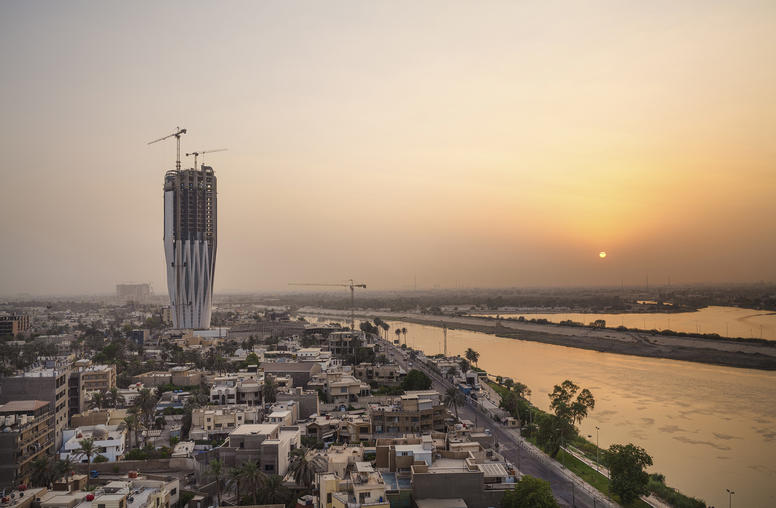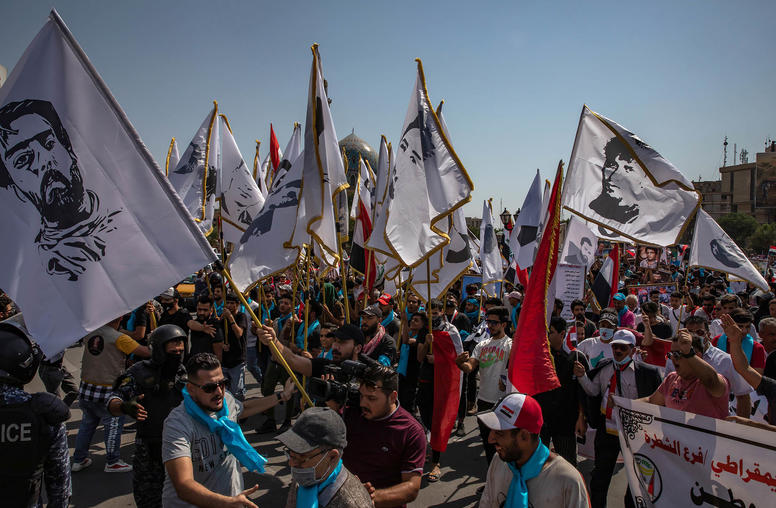Research & Analysis
U.S. Institute of Peace’s articles, reports, tools and other features provide policy analysis, research findings, and practitioner guides. These publications examine critical conflict issues at the center of the Institute’s work to prevent and resolve violent conflict.
The views expressed in these publications are those of the author(s).

Iraq’s al-Sudani Government, One Year Later
Last week marked one year since Iraq’s Prime Minister Mohammed Shia al-Sudani assumed office. His ascension to the role came after a year of deep political tensions, several alarming but contained episodes of violence, and no annual government budget. A political agreement among the Shia coalition known as the Coordination Framework and major Kurdish and Sunni Arab parties set the stage for the al-Sudani government to form — meanwhile, the biggest winner in the 2021 parliamentary elections, cleric and political leader Moqtada al-Sadr, decided to withdraw from the political process altogether.

Kurdish Official Lists ISIS and Climate Change as Top Threats
More than five years since the Iraqi government declared victory over ISIS, a senior Kurdish official says the terrorist group is among the top threats facing the region. Alongside ISIS, Rebar Ahmed, minister of interior in the Kurdistan Regional Government (KRG), listed climate change and the resource scarcities and migration it would trigger as a critical challenge.

Disengaging and Reintegrating Violent Extremists in Conflict Zones
Dealing with people who leave violent extremist groups has become one of the most pressing security issues of our time. Drawing on new primary research conducted by the author in Iraq, Syria, and Nigeria, and existing research on disengagement and reintegration, this report underscores the challenges of administering rehabilitation programs in conditions of chronic insecurity—and of doing so at a scale sufficient to make a difference to hundreds or even thousands of people in short order.

U.S., Iraq Emphasize Economic Cooperation as Core of Strategic Partnership
Sarhang Hamasaeed looks at the key priorities for the U.S.-Iraq partnership, the challenges and opportunities for Iraq’s new government, joint efforts to address the human legacy of ISIS and how Washington can help stabilize Iraq’s economy.

Fighting Corruption Harder than Fighting ISIS, Says Iraq’s Deputy Prime Minister
Iraqi Deputy Prime Minister Fuad Hussein on February 10 laid out the new Iraqi government’s priorities, outlined areas of common interest with the United States and defended his country’s relations with Iran, Russia and China — countries that are all at odds with the United States.

A Year After Elections, Iraq May Finally Be Set to Form a Government
Iraq hit two anniversaries this month. Three years ago in October, Iraqis rose up to protest the failure of the Iraqi government and political class in delivering basic services, providing jobs, fighting corruption and more. One of the outcomes of those protests was early elections, which were held on October 10, 2021, but have yet to yield a government. The last year witnessed crippling political gridlock, as the winner of the 2021 national parliamentary elections, Moqtada al-Sadr, eventually withdrew from the political process after failing to form a government.

Sarhang Hamasaeed on Iraq’s Deepening Political Stalemate
After recent episodes of violence, Iraq’s political stalemate continues. “Bottom line … this is a fight over power” and differing views on foreign influence, says USIP’s Sarhang Hamasaeed. “The Iraqi people are actually fighting for democracy. It is just the political class … that makes that a longer fight.”

What’s Behind Moqtada al-Sadr’s Bid to Shake up Iraq’s Politics?
Over the weekend, followers of the powerful Iraqi Shia cleric Moqtada al-Sadr stormed and occupied Iraq’s parliament in protest over a rival bloc attempting to form a government. The move comes less than two months after al-Sadr’s bloc in parliament resigned after its failure to form a majoritarian government following its victory in the October 2021 elections. Nearly 10 months after those elections, there is still no new government and the stability of the country is at stake as this showdown between al-Sadr’s supporters and his political rivals continues to play out.

ISIS is a Problem of Yesterday, Today and Tomorrow
More than three years after its military defeat in Iraq and Syria, ISIS is a downgraded threat thanks to the collective efforts of the U.S.-led global coalition that coalesced to defeat it along with Iraqi and Syrian partners. While the extremist group’s capacity has been drastically reduced and millions of people have returned home, ISIS has managed to continue attacks year after year despite no longer holding territory. Meanwhile, some of the most difficult human legacies — the challenges facing the people the ISIS conflict left behind — are still with us, with no end in sight.

Al-Hol: Displacement Crisis is a Tinderbox that Could Ignite ISIS 2.0
More than three years after ISIS’s territorial defeat, the vexing challenge of displacement threatens to provoke the rise of ISIS 2.0 if not adequately addressed. The May 11 Global Coalition to Defeat ISIS ministerial meeting in Marrakech, Morocco highlights these concerns over the evolving threat the so-called Islamic State still poses. The Marrakech meeting coincides with both growing disquiet at deteriorating humanitarian and security conditions in the al-Hol displacement camp in northeast Syria — ground zero for the ISIS-related displacement crisis — and some hope for a path forward.